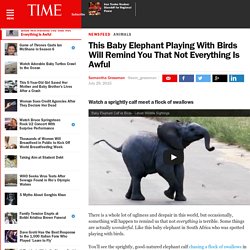

This Baby Elephant Playing With Birds Will Remind You That Not Everything Is Awful. Watch a sprightly calf meet a flock of swallows There is a whole lot of ugliness and despair in this world, but occasionally, something will happen to remind us that not everything is terrible.

Some things are actually wonderful. Like this baby elephant in South Africa who was spotted playing with birds. You’ll see the sprightly, good-natured elephant calf chasing a flock of swallows in Kruger National Park. We can only imagine that shortly after this video was recorded, the elephant struck up a friendship with a few of the birds and now they’re all off somewhere creating a special language. Mini Horses and Toddler Friends May Be the Cutest Thing Ever Published in LIFE Ed Clark—The LIFE Picture Collection/Getty Images 3-year-old cover girl Cynthia West with Chauncey. Read next: This Adorable Teddy Bear Dog Is About to Take Over the Internet Download TIME’s mobile app for iOS to have your world explained wherever you go. Watch Wild Elephant Awaken After Being Saved From Poison Arrow. By Kristin Davis The last time I was in Kenya, flying in one of the David Sheldrick Wildlife Trust’s (DSWT) aerial surveillance airplanes, I was on the way to see one of the most tragic sights I’ve ever seen in my life.

Two massive elephants had been poached near the Tiva River, in Tsavo National Park. Like all poaching victims, their deaths had been torturous. The poachers had climbed up the electrical tower nearby and cut thick cable from it. Then they’d set up wire snares using the cable. The massive elephant was left circling the tree endlessly trying to free himself, until he became so weak that that poachers could move in and hack the tusks off his face. Sadder still was the coffee pot and the ashes of a fire just out of reach of the elephant’s circle of distress. The scene of cruel deaths like his has haunted me in the years since. Now it’s early 2015, and I’m in Kenya again, visiting the David Sheldrick Wildlife Trust. Why elephants never forget - Alex Gendler. How do elephants communicate?

The website Elephant Voices allows you access to elephant vocalizations of all types. Plug in your earphones and have a listen! While on this site check out Echo of the elephants, one of the longest studied matriarchs of any elephant group in the world. You can also watch her story on PBS Nature. Learn about the Amboseli Trust for Elephants set up by scientist Cynthia Moss.
For more about elephant communication, follow the research of Cornell scientist Michael Pardo: Do Asian elephant calls have grammar-like elements? Standing tall, head waggling, ear spreading and periscope sniff? Elephants use sticks to scratch their backs? Elephants have been shown to have emotions. Now you know some things about elephants. Pongola Game Reserve KZN South Africa. 04 December 2014, Pongola, South Africa: Pongola Game Reserve, a privately-owned big-four game reserve in Northern Kwa-Zulu Natal, today reported the birth of African elephant twins.

Scientific evidence suggests that there is less than one percent prevalence rate of elephants twinning and even less of a chance that both twins survive into adulthood, making the birth of these young elephant twins an incredibly rare natural occurrence. Elephant specialist, Dr. Ian Whyte, the retired Projects Manager: Large Herbivores: Dept. of Scientific Services at the National Parks Board, Kruger National Park says, “Though a few cases of twinning have been reported in the Kruger National Park, an examination of the reproductive tracts of over 1200 adult cows culled in the Kruger National Park during population control operations did not yield a single case of twins*.
An earlier study published by Smuts in 1975** found two sets of twins among 353 embryos examined which is a 0.5% prevalence.” References: Ban Ivory Sales. If the United States and other nations do not fully ban the sale of ivory, African elephants could be extinct -- poof -- in as few as five years.

Today, on average, one elephant is killed every fifteen minutes. "The animal which surpasses all others in wit and mind," as Aristotle once called the grandest of land animals, is being hunted for its tusks so quickly that most large herds will be gone as soon as 2020, experts warn. Photo: Getty Images The window to save the African elephant from extinction is closing fast.
Today only about 400,000 elephants roam Africa's savannah and forests, down from 1.3 million in 1979, and their numbers are dropping rapidly. This death toll -- and the virtual extinction of one of earth's most exquisitely intelligent and altruistic species that it foreshadows -- is heartbreaking. The solution is simple: to save elephants from extinction, the ivory and rhino horn trade in the U.S. and throughout the world must end immediately.
The U.S. Tell China that.